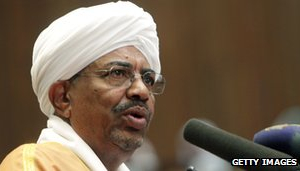In the wake of South’s re-launch of oil production, Sudan and South Sudan presidents have reaffirmed their commitment to carry out the security agreement, including ceasing all forms of support and shelter for armed groups on both sides.
On his first visit to the South since its independence, Sudan President Omar Hassan Al-Bashir has announced that he has ordered the border with South Sudan to be opened. Speaking alongside his southern counterpart Salva Kiir Mayardit, Mr. Bashir also called for peace and normal relations, according to BBC.
Both presidents have restated this security settlement is as important as other cooperation between the two countries at a press conference in Juba, capital of South Sudan, according to Xinhua.
"I have instructed Sudan's authorities and civil society to open up to their brothers in the Republic of South Sudan," said Mr Bashir, according to BBC.
Sudan's president invited Mr Kiir to Khartoum for further talks and he also addressed worshippers at a mosque in Juba.
"We won't go back to war," he said, according to BBC. "President Kiir and I agreed that the war was too long."
For his part, Mr Kiir said that he and Mr Bashir had agreed to implement all co-operation agreements, the BBC reports.
An agreement to withdraw troops from their border area was signed by both sides in Addis Ababa, Ethiopia, on March 8, 2013. Both presidents praised the progress that is being made in setting up the demilitarized buffer zone.
Brokered by the African Union September, the deal stipulated that the United Nations Interim Security Force for Abyei would monitor the demilitarized zone with participation of military personnel from both sides.
Mr Bashir and Mr Kiir emphasized the importance for the African Union monitoring team to follow up on the implementation of the security agreement.
In 2011, South seceded on July with the consent of Sudan after a referendum held in January that year. This secession took place after decades of civil war and ethnic, religious, and economic conflicts between Muslim Arabs of Northern Sudan and mostly animist and Christian Nilotes of Southern Sudan.
South Sudan took with it nearly three-quarters of Sudan’s oil production when it declared independence and the two sides disputed how much the South should pay to export its oil through Sudanese pipelines.
As a result, issues surrounding territory and oil production remain unresolved.
Last January, the new African country shut down its entire oil output of 350,000 barrels a day at the height of dispute over pipeline fees. The closure devastated the struggling economies of the divorced states.
According to BBC, both sides agreed to restart oil shipments, grant each others’ citizens residency, increase border trade and encourage close cooperation between their central banks.
Last week, South Sudan re-launched oil production with the first oil cargo to reach Sudan’s export terminal by the end of May, according to BBC.



















